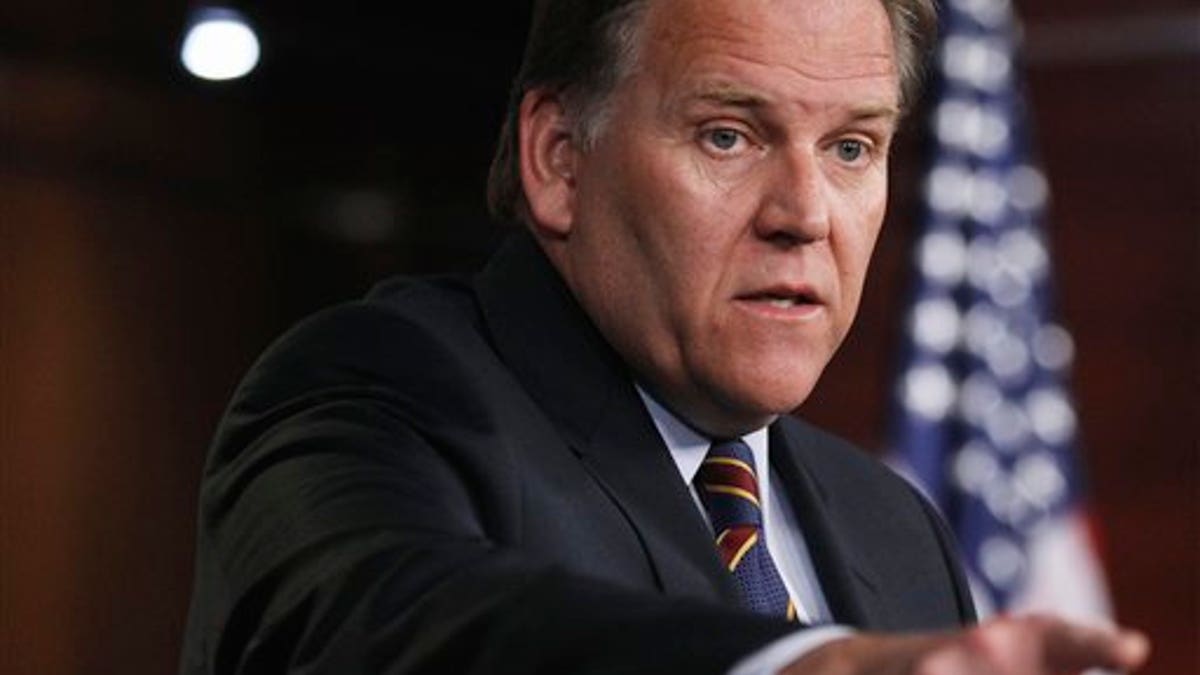
House Intelligence Committee Chairman Rep. Mike Rogers, R-Mich., speaks to reporters during a news conference on Capitol Hill in Washington, Monday, May 2, 2011, to talk about the death of Osama bin Laden.(AP)
In between applauding President Obama for overseeing the successful raid on Usama bin Laden's compound, some Republicans and ex-officials are starting to question what they see as a disconnect: How can the administration be investigating CIA agents whose techniques may have led America to Al Qaeda's top guy?
They're calling on the Obama administration to not only restart the CIA interrogation program in some form, but to end once and for all the Justice Department's probe of CIA employees.
"You can't have it both ways," Rep. Mike Rogers, R-Mich., chairman of the House Intelligence Committee, told Fox News. "You can't have the attorney general prosecuting CIA interrogators, by the way, who may have gotten information that may have aided in catching Usama bin Laden.
"It just doesn't make any sense to me," he said.
There is a raging debate on Capitol Hill over whether so-called enhanced interrogation techniques, including waterboarding, played a role in tracking bin Laden. Sen. Dianne Feinstein, D-Calif., chairwoman of the Senate Intelligence Committee, said Tuesday that it appears "none" of the intelligence came from the "harsh interrogation practice."
The White House stresses that a range of sources contributed, and that no single bit of information was a deciding factor.
But CIA Director Leon Panetta said in an interview Tuesday that some of the detainees who gave up information "clearly" were subjected to these techniques, including waterboarding.
Rep. Peter King, R-N.Y., chairman of the House Homeland Security Committee, said key information came out of detainee Khalid Sheikh Mohammed after waterboarding.
A senior U.S. official later told Fox News the initial intelligence came out of the CIA program in 2003. Fox News has learned that Mohammed provided the nickname of the Al Qaeda courier who ultimately led the U.S. to bin Laden about three to four months after he was waterboarded.
The question is how big a role the waterboarding and other techniques played in persuading Mohammed, and others, to cooperate.
Some say it had little effect, pointing to claims that he did not give up the information right away. Others suggest waterboarding and other tactics must have been a significant factor.
One senior U.S. official with knowledge of the CIA program said waterboarding was not used to elicit information. Rather, it was used to take operatives like Mohammed and shift them from a spirit of defiance to one of cooperation.
Former Bush adviser Karl Rove made a similar argument. He said it's "clear" that enhanced interrogation helped "create an environment that gave rise to this information."
"The purpose of waterboarding is not to elicit information. It is to break the spirit of the detainee and create an environment in which they begin to cooperate," he told Fox News. Rove said detainees will say anything during the course of waterboarding, but that in the aftermath they may start talking -- he cited the "seminars" Mohammed was said to have held later on during his detention.
Adding to the backstory, former CIA counterterrorism chief Jose Rodriguez told Time magazine that two key sources, Mohammed and Abu Faraj al-Libbi, were held at secret sites overseas and subjected to enhanced interrogation. He said information from al-Libbi was particularly useful.
Though al-Libbi was not waterboarded, Rodriguez said the detainee gave key information about the courier just a week after enduring other tough methods. He told Time that the U.S. should revive the controversial interrogation tactics.
John Yoo, the author of the Justice Department memos that helped justify the CIA interrogation techniques during the Bush administration, agreed. And, like Rogers, he urged the Obama administration's Justice Department to drop its probe of the CIA.
"Mr. Obama deserves credit for ordering the mission that killed bin Laden. But he should also recognize that he succeeded despite his urge to disavow Bush administration policies. Perhaps one day he will acknowledge his predecessor's role in making this week's dramatic success possible," Yoo wrote in a Wall Street Journal column Wednesday. "More importantly, he should end the criminal investigation of CIA agents and restart the interrogation program that helped lead us to bin Laden."
Attorney General Eric Holder launched that investigation in late 2009, appointing a special prosecutor to review cases of possible detainee abuse at the hands of CIA agents. Around the same time, the administration shifted responsibility for interrogations of top terror suspects away from the CIA. At the beginning of his term, Obama had ordered that interrogations stick to the guidelines in the Army Field Manual.
But there are deep concerns involved in any suggestion that the U.S. military revive the CIA interrogation program, which some lawmakers have described as torture.
"I don't know that torture actually produces results," Sen. Kirsten Gillibrand, D-N.Y., told Fox News. "I don't think it's an approach we should take, and I don't think it's the American way."




